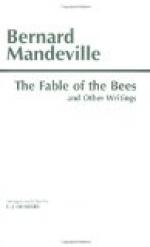|
This section contains 6,043 words (approx. 21 pages at 300 words per page) |

|
SOURCE: Goldsmith, M. M. “Mandeville's Pernicious System.” In Mandeville and Augustan Ideas: New Essays, edited by Charles W. A. Prior, pp. 71-84. Victoria, Canada: English Literary Studies, University of Victoria, 2000.
In the following essay, Goldsmith analyzes the validity of the claims by his detractors that Mandeville was promoting immorality and irreligion in The Fable of the Bees.
Bernard Mandeville's The Fable of the Bees caught the attention of virtually every thinker of note in the eighteenth century.1 The book was widely attacked for irreligion and immorality; contemporary periodicals commented on the stir it made.2 When Adam Smith, in his Theory of Moral Sentiments,3 denounced Mandeville's views as “wholly pernicious,” he joined such critics as William Law, Francis Hutcheson, George Berkeley and David Hume.
In fact, the Fable became famous because it was denounced. The first edition of 1714, apart from the modest success of achieving two printings, went unnoticed...
|
This section contains 6,043 words (approx. 21 pages at 300 words per page) |

|


